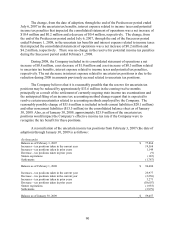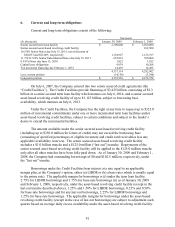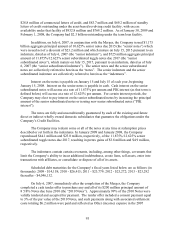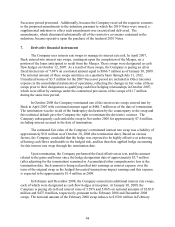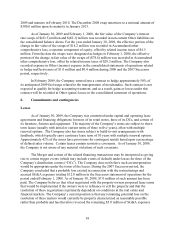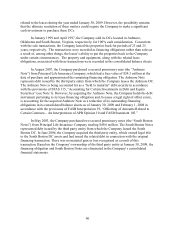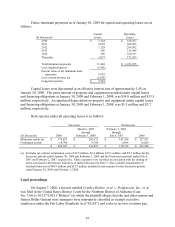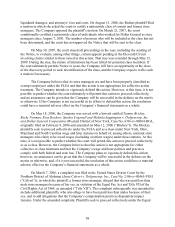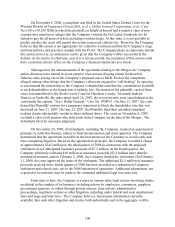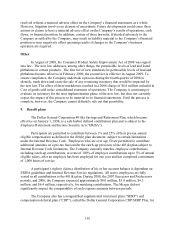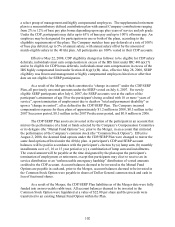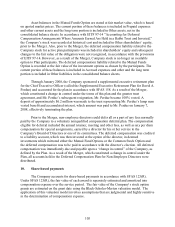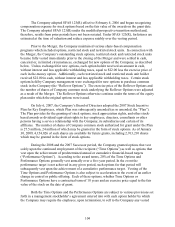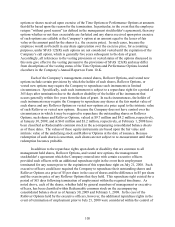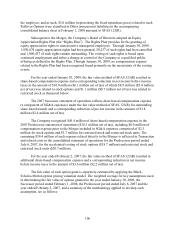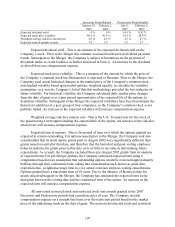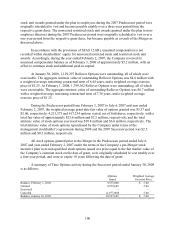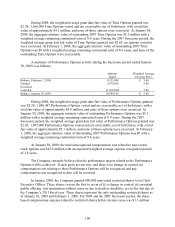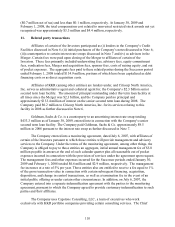Dollar General 2008 Annual Report Download - page 102
Download and view the complete annual report
Please find page 102 of the 2008 Dollar General annual report below. You can navigate through the pages in the report by either clicking on the pages listed below, or by using the keyword search tool below to find specific information within the annual report.100
On December 4, 2008, a complaint was filed in the United States District Court for the
Western District of Tennessee (Tressa Holt, et al v. Dollar General Corporation, et al., Case
No.1:08-cv-01298 JDB) in which the plaintiff, on behalf of herself and a putative class of non-
exempt store employees, alleges that the Company violated the Fair Labor Standards Act by
failing to pay for all hours worked, including overtime hours. At this time, it is not possible to
predict whether the court will permit this action to proceed collectively. However, the Company
believes that this action is not appropriate for collective treatment and that the Company’ s wage
and hour policies and practices comply with the FLSA. The Company plans to vigorously defend
this action; however, no assurances can be given that the Company will be successful in the
defense on the merits or otherwise, and, if it is not successful, the resolution of this action could
have a material adverse effect on the Company’ s financial statements as a whole.
Subsequent to the announcement of the agreement relating to the Merger, the Company
and its directors were named in seven putative class actions alleging claims for breach of
fiduciary duty arising out of the Company’ s proposed sale to KKR. Each of the complaints
alleged, among other things, that the Company’ s directors engaged in “self-dealing” by agreeing
to recommend the transaction to the Company’ s shareholders and that the consideration available
to such shareholders in the transaction is unfairly low. On motion of the plaintiffs, each of these
cases was transferred to the Sixth Circuit Court for Davidson County, Twentieth Judicial
District, at Nashville. By order dated April 26, 2007, the seven lawsuits were consolidated in the
court under the caption, “In re: Dollar General,” Case No. 07MD-1. On June 13, 2007, the court
denied the Plaintiffs’ motion for a temporary injunction to block the shareholder vote that was
then held on June 21, 2007. On June 22, 2007, the Plaintiffs filed their amended complaint
making claims substantially similar to those outlined above. The court on November 6, 2008
certified a class of all persons who held stock in the Company on the date of the Merger. The
defendants filed for summary judgment.
On November 24, 2008, all defendants, including the Company, reached an agreement in
principle to settle this lawsuit, subject to final documentation and court approval. The Company
determined that the agreement would be in the best interest of the Company to avoid costly and
time consuming litigation. Based on the agreement in principle, the Company recorded a charge
of approximately $34.5 million in the third quarter of 2008 in connection with the proposed
settlement, net of anticipated insurance proceeds of $7.5 million. In the fourth quarter, the
Company ultimately collected $10 million in insurance proceeds ($2.5 million more than the
anticipated amount), and on February 2, 2009, the Company funded the settlement. On February
11, 2009, the court approved the terms of the settlement. The additional $2.5 million in insurance
proceeds received in the fourth quarter of 2008 has been recorded as a reduction of Litigation
settlement and related costs, net in the 2008 statement of operations. Additional adjustments, not
expected to be material, may be made to the estimated additional legal fees and costs.
From time to time, the Company is a party to various other legal actions involving claims
incidental to the conduct of its business, including actions by employees, consumers, suppliers,
government agencies, or others through private actions, class actions, administrative
proceedings, regulatory actions or other litigation, including under federal and state employment
laws and wage and hour laws. The Company believes, based upon information currently
available, that such other litigation and claims, both individually and in the aggregate, will be


